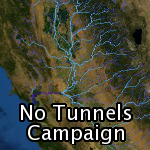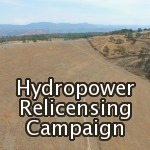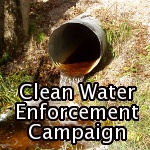On April 6, 2022, CSPA and allied organizations AquAlliance and California Water Impact Network filed a protest and objection to a “Temporary Urgency Change Petition” for April-June 2022 water operations in the Delta. The California Department of Water Resources (DWR) and the US Bureau of Reclamation (Reclamation) filed the petition on March 18. CSPA et al. argue that the State Water Board must grant the petition only if the Board also limits diversions by contractors to DWR’s State Water Project (SWP) and Reclamation’s Central Valley Project (CVP) to amounts needed for health and safety and for wildlife refuges, and if the Board bans transfers of water stored in SWP and CVP reservoirs.
The stage was set in 2021 when DWR and Reclamation over-delivered water to contractors and allowed late season transfers of water stored in Shasta Reservoir. This had severe impacts on fisheries and left SWP and CVP reservoirs with drastically little water left in storage. As CSPA reported on January 17, 2022, CSPA et al. filed a Petition for Writ of Mandate asking a court to set aside the State Water Board’s June 1, 2021 approval of Reclamation and DWR’s TUCP for 2021 Delta operations, and a second Petition for Writ of Mandate asking a court to set aside the State Water Board’s approval of Reclamation’s Sacramento River Temperature Management Plan (TMP) for Water Year 2021.
Rains in October and December 2021 replenished some storage. In December, DWR and Reclamation submitted, but in January 2022 withdrew, a TUCP for Delta operations. Extremely dry months since New Years have left DWR and Reclamation with less overall storage than in 2021, prompting the March TUCP. In a partial turnaround, DWR and Reclamation now propose in 2022 to deliver substantially less water to contractors in aggregate than they delivered in 2021. However, the TUCP does not explicitly propose reduced deliveries or to eliminate water transfers, and the State Water Board’s April 4 Order granting the TUCP does not explicitly include such requirements.
In 2021, DWR and Reclamation could have saved fish and water by implementing CSPA’s alternative Sacramento River TMP and the diversion reductions it proposed. (For description and links, see CSPA’s June 6, 2021 post.) There was enough stored water in 2021 to keep Delta critical year water quality requirements and to do a better job of protecting salmon in the Sacramento River. In a draft 2022 TMP released April 6, Reclamation is proposing releases from Shasta Reservoir that are nearly identical to those the CSPA proposed in 2021.
Regrettably, a year later, it is no longer enough. As CSPA et al.’s protest and objection to the March 2022 TUCP puts it:
The water that should have been stored to create options to protect public trust resources in 2022 was lost in 2021 to canals and sluice gates and transfers. … The State Water Board, in deciding what it must do in 2022 … is a year late and hundreds of thousands of acre-feet short, because in 2021 it did not adopt CSPA’s proposed TMP or something functionally equivalent in terms of maintaining reservoir storage.
So CSPA et al. are stuck in the miserable position, in 2022, of not having an alternative source of water to propose that DWR and Reclamation could use to meet water quality standards in the Delta.
Though DWR and Reclamation must finally face up to the consequences of their reckless over-deliveries in 2021 (and 2020), and now propose drastic cuts to water deliveries to senior “settlement” contractors north of Delta, they have not done so as a regulatory requirement. Thus, even in extreme circumstances of their own making, DWR and Reclamation remain in control of what they generally term “voluntary” measures that are minimally enforceable or not enforceable at all.
And, in its April 4 Order approving the TUCP, the State Water Board retains its hands-off culture and posture as a non-regulator that cedes its regulatory role to the “trust us” mantra of entities that have shown themselves reliably irresponsible.









